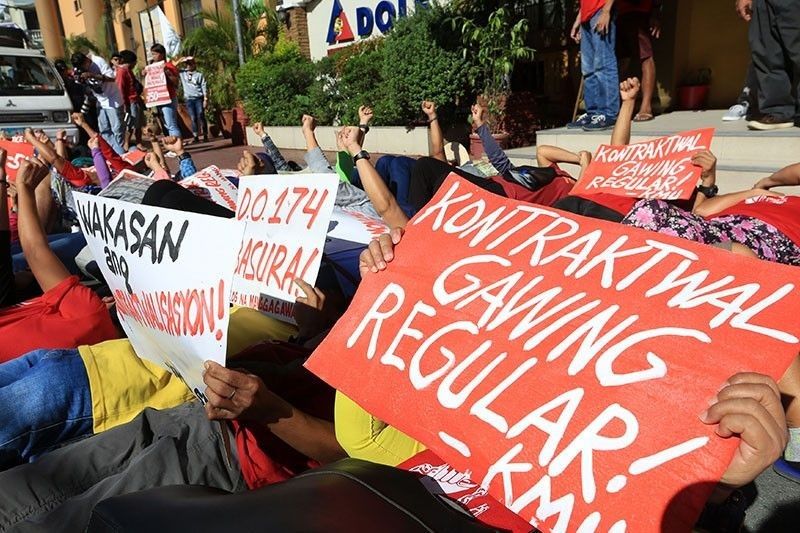Security of Tenure bill not quite end of 'endo', labor groups say

MANILA, Philippines — In line with a campaign promise, President Rodrigo Duterte has ordered a crackdown on companies hiring employees on short-term contracts. On Wednesday, a bill seeking to ensure job security moved closer to his desk after senators approved the measure on final reading.
Voting 15-0, senators okayed Senate Bill 1826, popularly known as the “End Endo bill,” just before Congress adjourns in three weeks. The proposed measure seeks to prohibit the practice of labor-only contracting or the so-called “endo,” a Filipino-coined term for “end of contract.”
Endo is an abusive labor practice where a worker is hired for up to five months to skirt a labor law granting permanent tenure on the sixth month of service. The practice leaves many Filipino workers unprotected and without benefits.
Under the newly-approved bill, labor-only contracting exists when any of the following instances occur:
- The job contractor merely supplies, recruits, and places workers to a “contractee.”
- The workers supplied to a contractee perform tasks/activities that are listed by the industry to be directly related to the core business of the contractee.
- The contractee has direct control and supervision of the workers supplied by the contractor.
The measure also classifies workers under four employment types: regular, probationary, project and seasonal. The bill states that project and seasonal workers have the same rights as regular employees like the payment of minimum wage and social protection benefits, among others, for the duration of their employment.
Job contracting still allowed
However, the Senate version of the End Endo Bill did not completely prohibit job contracting, an arrangement where an employer, known as the principal, farms out jobs to a third-party contractor who then hires workers of its own.
Various stakeholders had expressed their concern that removing "endo," without making it clear that “legitimate contractualization” will remain, might make the country less competitive.
"We listened to the concerns of various stakeholders, and took these into account in putting together this bill. We believe this measure protects the interests of all parties concerned," Sen. Joel Villanueva, principal author of the bill, said in a statement.
"The provision trims down the employment arrangements and addresses the current practice of misclassifying employees to prevent them from obtaining regular status," Villanueva added.
According to Villanueva, the bill requires contractors to obtain a license from the Department of Labor and Employment. to engage in job contracting.
Making contractors submit themselves to licensing will allow DOLE to scrutinize their capacity to adhere to existing labor laws and regulation, and gauge their ability to provide for their employees, Villanueva explained.
Despite the remaining session days, Villanueva said he is optimistic that the bill will have just enough time to be tackled by a bicameral conference committee.
‘Loopholes’
Commenting on the Senate’s approval of the bill, the Trade Union Congress of the Philippines said the latest development “will begin the process of finally ending contractualization.”
"By a vote of 15-0, the Senate also brushed aside the apprehensions and objections made by Finance Secretary Sonny Dominguez that the bill would negatively affect the economy and was contrary to the interest of management flexibility,” TUCP President Raymond Mendoza said in a statement.
“We remind Secretary Dominguez that TUCP also respects management flexibility, but it must be consistent with the constitutional rights of workers, the right to security of tenure, the laws and the higher goals of building decency and fairness in a society faced with growing income and social inequality," Mendoza added.
For Leody de Guzman of Bukluran ng Manggagawang Pilipino, to celebrate the passage of the End Endo bill at the Senate “is premature, if not downright mistaken.”
“The proposal is far from labor's demand to abolish trilateral work arrangements, which is the basis for the anti-worker scheme of contractualization,” De Guzman said in an interview.
“The Senate bill, which seeks stricter regulation of job contracting, is full of loopholes,” he added.
Despite the Senate approval of the bill, De Guzman said “the call for prohibition, not regulation, stays.”
“It may place harsher penalties to erring employers. But if it maintains the legality of a scheme for cheap and docile workers, we may have a law that swears to the innocence of all principal and contractors in trilateral work schemes,” De Guzman said.
“The ball is still in Duterte's court and his electoral promise to end contractualization remains unfulfilled,” he added. — Ian Nicolas Cigaral
- Latest
- Trending

































